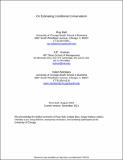On Estimating Conditional Conservatism
Author(s)
Ball, Ray; Kothari, S. P.; Nikolaev, Valeri V.
DownloadKothari_On estimating.pdf (272.9Kb)
OPEN_ACCESS_POLICY
Open Access Policy
Creative Commons Attribution-Noncommercial-Share Alike
Terms of use
Metadata
Show full item recordAbstract
The concept of conditional conservatism (asymmetric earnings timeliness) has provided new insight into financial reporting and stimulated considerable research since Basu (1997). Patatoukas and Thomas (2011) report bias in firm-level cross-sectional asymmetry estimates that they attribute to scale effects. We do not agree with their advice that researchers should avoid conditional conservatism estimates and inferences from research based on such estimates. Our theoretical and empirical analyses suggest the explanation is a correlated omitted variables problem that can be addressed in a straightforward fashion, including fixed-effects regression. Correlation between the expected components of earnings and returns biases estimates of how earnings incorporate the information contained in returns. Further, the correlation varies with returns, biasing asymmetric timeliness estimates. When firm-specific effects are taken into account, estimates do not exhibit the bias, are statistically and economically significant, are consistent with priors, and behave as a predictable function of book-to-market, size, and leverage.
Date issued
2012-12Department
Sloan School of ManagementJournal
The Accounting Review
Publisher
American Accounting Association
Citation
Ball, Ray, S. P. Kothari, and Valeri V. Nikolaev. “On Estimating Conditional Conservatism.” The Accounting Review 88, no. 3 (May 2013): 755–787.
Version: Author's final manuscript
ISSN
0001-4826
1558-7967